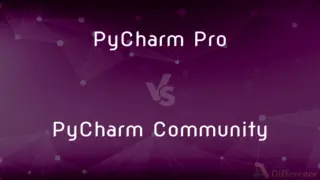Rebellion vs. Disobedience — What's the Difference?
By Tayyaba Rehman & Urooj Arif — Updated on May 6, 2024
Rebellion is an organized resistance to authority, often involving violence, while disobedience refers to non-compliance with rules or instructions, typically on an individual level.

Difference Between Rebellion and Disobedience
Table of Contents
ADVERTISEMENT
Key Differences
Rebellion is an active, organized uprising against established authority, usually involving large groups and often characterized by violence or attempts to overthrow. Disobedience, on the other hand, tends to be individual or small-scale non-compliance with specific rules or commands without necessarily seeking systemic change.
Rebellion usually involves a comprehensive strategy aimed at changing the structure of authority or government. Disobedience, in contrast, may not aim to upend the entire system but rather to highlight opposition to specific regulations or practices.
Rebellion frequently manifests in the form of political or social movements striving for dramatic transformations. Disobedience is often more localized and may involve simple refusal to follow particular laws or commands.
Rebellion is often seen in historical contexts where groups fight oppressive regimes to attain autonomy or justice. Disobedience, however, may involve a peaceful, civil refusal, often tied to personal, ethical, or moral objections.
Rebellion can carry severe legal consequences due to its confrontational nature and intent. Disobedience might also face punitive measures but is less likely to be viewed as a direct threat to the establishment.
ADVERTISEMENT
Comparison Chart
Scope
Large-scale, organized
Small-scale, individual
Intent
Overthrow authority
Non-compliance with specific rules
Tactics
Violence or direct confrontation
Peaceful or minor resistance
Legal Consequences
Severe, often treasonous
Moderate to severe, based on laws broken
Historical Impact
Significant societal changes
Highlighting moral/ethical issues
Compare with Definitions
Rebellion
Armed resistance against an established government.
The country's history is marked by a famous rebellion against colonial rule.
Disobedience
Failure to follow orders or rules.
The employee's disobedience led to his termination.
Rebellion
Open opposition or defiance to authority.
The students staged a rebellion against the school's strict dress code.
Disobedience
Active refusal to comply with instructions.
The act of disobedience was a silent protest against the unfair policy.
Rebellion
The state of resisting authority.
Their rebellion against the new regulations was evident in the protest signs.
Disobedience
Minor resistance against established norms.
The child's disobedience was reprimanded with a warning.
Rebellion
An uprising intended to change government policies.
The workers' rebellion was rooted in demands for fair wages.
Disobedience
Peaceful opposition to certain laws or regulations.
The activists practiced civil disobedience to draw attention to their cause.
Rebellion
A rejection of societal norms or expectations.
His artistic style was a form of rebellion against traditional aesthetics.
Disobedience
Defying authority due to personal principles.
Her disobedience came from a deep sense of moral conviction.
Rebellion
Rebellion, uprising, or insurrection is a refusal of obedience or order. It refers to the open resistance against the orders of an established authority.A rebellion originates from a sentiment of indignation and disapproval of a situation and then manifests itself by the refusal to submit or to obey the authority responsible for this situation.
Disobedience
Refusal or failure to obey.
Rebellion
An act of armed resistance to an established government or leader
The authorities put down a rebellion by landless colonials
The Bretons rose in rebellion against the King
Disobedience
Refusal to obey.
The teacher complained of the child's disobedience.
Rebellion
Open, armed, and organized resistance to a constituted government.
Disobedience
Neglect or refusal to obey; violation of a command or prohibition.
He is undutiful to him other actions, and lives in open disobedience.
Rebellion
An instance of this.
Disobedience
The failure to obey
Rebellion
Defiance toward an authority or established convention
An act of adolescent rebellion.
Disobedience
The trait of being unwilling to obey
Rebellion
An instance of this.
Rebellion
(uncountable) Armed resistance to an established government or ruler.
The government is doing its best to stop rebellion in the country.
Rebellion
(countable) Defiance of authority or control; the act of rebelling.
Having a tattoo was Mathilda's personal rebellion against her parents.
Rebellion
(countable) An organized, forceful subversion of the law of the land in an attempt to replace it with another form of government.
The army general led a successful rebellion and became president of the country.
Rebellion
The act of rebelling; open and avowed renunciation of the authority of the government to which one owes obedience, and resistance to its officers and laws, either by levying war, or by aiding others to do so; an organized uprising of subjects for the purpose of coercing or overthrowing their lawful ruler or government by force; revolt; insurrection.
No sooner is the standard of rebellion displayed than men of desperate principles resort to it.
Rebellion
Open resistance to, or defiance of, lawful authority.
Rebellion
Refusal to accept some authority or code or convention;
Each generation must have its own rebellion
His body was in rebellion against fatigue
Rebellion
Organized opposition to authority; a conflict in which one faction tries to wrest control from another
Common Curiosities
Are the legal consequences similar for rebellion and disobedience?
No, rebellion is considered a severe offense like treason, while disobedience may have less severe penalties.
Do both rebellion and disobedience have similar motivations?
They can, often rooted in a desire for change, but rebellion is generally more comprehensive in scope.
How do historical examples differentiate rebellion from disobedience?
Rebellions, like the American Revolution, aimed to establish a new government, while acts of civil disobedience, like Gandhi's Salt March, highlighted specific issues.
Is rebellion common in democracies?
It's less common, as democracies provide mechanisms for change, but disobedience can still occur.
Can rebellion sometimes start peacefully?
Yes, many rebellions begin as peaceful protests before escalating due to repression or lack of response.
Is civil disobedience the same as rebellion?
Civil disobedience is a form of peaceful resistance to specific laws, whereas rebellion aims to overthrow broader authority.
Can disobedience lead to rebellion?
Yes, widespread disobedience can escalate into organized rebellion if there's collective frustration.
Can disobedience be considered constructive?
Yes, civil disobedience is often viewed as a moral stance that can lead to positive social changes.
How does society generally perceive disobedience and rebellion?
Disobedience might be seen as a moral stand, while rebellion is often viewed negatively due to its confrontational nature.
Does rebellion always involve violence?
Not always, but it often includes violent resistance, whereas peaceful rebellions do occur.
Can individuals commit rebellion?
Not typically, as rebellion implies organized group action, unlike individual disobedience.
Do rebellion and disobedience always have political motives?
They often do, but disobedience can also be driven by personal or moral reasons.
Is rebellion ever justified legally?
Most legal systems do not justify rebellion due to its threat to stability.
How does leadership influence the outcome of rebellions versus disobedience?
Strong leadership can unify and drive organized rebellions to success, while disobedience often requires charismatic figures to inspire collective action.
Do the media portray rebellion and disobedience differently?
Yes, disobedience is sometimes framed as activism, while rebellion is often associated with conflict.
Share Your Discovery

Previous Comparison
Desire vs. Fantasy
Next Comparison
Younger vs. YoungestAuthor Spotlight
Written by
Tayyaba RehmanTayyaba Rehman is a distinguished writer, currently serving as a primary contributor to askdifference.com. As a researcher in semantics and etymology, Tayyaba's passion for the complexity of languages and their distinctions has found a perfect home on the platform. Tayyaba delves into the intricacies of language, distinguishing between commonly confused words and phrases, thereby providing clarity for readers worldwide.
Co-written by
Urooj ArifUrooj is a skilled content writer at Ask Difference, known for her exceptional ability to simplify complex topics into engaging and informative content. With a passion for research and a flair for clear, concise writing, she consistently delivers articles that resonate with our diverse audience.













































